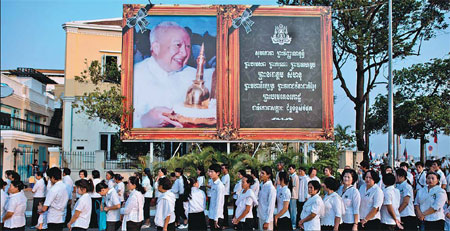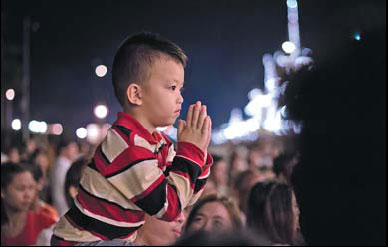Leaders pay last respects to Sihanouk
Updated: 2013-02-05 07:47
By Zhao Shengnan and Zhou Wa in Beijing, Qin Jize in Phnom Penh (China Daily)
|
||||||||
|
Thousands of Cambodians line up to enter the crematorium where the coffin of King Norodom Sihanouk rests in Phnom Penh on Monday. Photos by Nicolas Asfouri / Agence France-Presse |
|
A Cambodian boy, sitting on his father's shoulder for a better view, pays his respects in front of the crematorium where the coffin bearing the remains of King Norodom Sihanouk is placed. |
Beijing conveys grief over loss of close friend
China's top legislator Jia Qinglin joined other foreign leaders and tens of thousands of Cambodians in Phnom Penh on Monday to pay their last respects during the cremation of late King Norodom Sihanouk.
Jia leader of China's top political advisory body, attended the cremation ceremony, conveying the grief of the Chinese people and leaders, and pledging closer ties with Cambodian leaders during the post-Sihanouk era.
During a meeting with Jia on Monday, Queen Mother Norodom Monineath Sihanouk and King Norodom Sihamoni expressed their heartfelt thanks to the Chinese side. They said King-Father Sihanouk loved China very much and received thoughtful care from the Chinese government.
They said they would never forget the profound friendship and the Cambodian Royal family will firmly support Cambodia-China relations as well as the development of various undertakings in China. Jia also met with Cambodian Prime Minister Hun Sen on the same morning.
Officials and observers said Jia's presence, along with Beijing's series of high-profile moves mourning Sihanouk over the past months, demonstrates both sides' commitment to their strategic partnership as well as to a good diplomatic model between big and small countries.
Sihanouk's body had been lying in state since he died of a heart attack in Beijing on Oct 15 at the age of 90. The weeklong funeral, which started on Friday, will see some of his ashes returned to the Royal Palace and some scattered near the confluence of the four rivers in Phnom Penh on Thursday.
The death of Sihanouk will not affect the existing good relationship between Cambodia and China, instead it will be further strengthened and expanded, said Kao Samreth, charge d'affaires of the Cambodian embassy to China. "The government and people of China have always assisted and supported His Majesty since he was alive till the end of his life. This friendly gratitude is always remembered by leaders and people of Cambodia."
Having twice lived in exile in China, Sihanouk often referred to the country as his "second homeland". He returned to the throne twice with the strongest political support from China in times of adversity and had almost all his medical treatment in the last years of his life after being diagnosed with prostate cancer in 1994.
"Both countries are linked together. I do not believe that anything could break that relationship, and we will further improve cooperation and friendly relations with the People's Republic of China," Prince Sisowath Thomico, the spokesman for the Royal Cabinet and former aide to Sihanouk, told Xinhua News Agency.
This year marks the 55th anniversary of the establishment of China-Cambodia diplomatic ties.
Jia Xiudong, a senior researcher at the China Institute of International Studies, said some ASEAN countries can learn about problem solving from the development of China-Cambodia ties, which also have difficulties like huge trade imbalances. "The key is both countries are willing to work together based on mutual respect and are confident that China would never hurt the bloc's interests," he said.
Bilateral trade volume between Cambodia and China amounted to $2.5 billion in 2011, up 73.5 percent from a year earlier, according to official statistics.
China's support means a lot to Cambodia, which is seeking more influence in the international community, said Song Yinghui, a researcher on Southeast Asian studies with the China Institutes of Contemporary International Relations.
"But such bilateral relations are not a hierarchical one as some countries claim. Cambodia, which has suffered from colonization and instability for decades, highly values independence and has gained worldwide recognition for independently solving ethnic and economic issues," said Song.
Contact the writers at zhaoshengnan@chinadaily.com.cn
(China Daily 02/05/2013 page12)

 In Photos: 7.0-magnitude quake hits Sichuan
In Photos: 7.0-magnitude quake hits Sichuan
 Li Na on Time cover, makes influential 100 list
Li Na on Time cover, makes influential 100 list
 FBI releases photos of 2 Boston bombings suspects
FBI releases photos of 2 Boston bombings suspects
 World's wackiest hairstyles
World's wackiest hairstyles
 Sandstorms strike Northwest China
Sandstorms strike Northwest China
 Never-seen photos of Madonna on display
Never-seen photos of Madonna on display
 H7N9 outbreak linked to waterfowl migration
H7N9 outbreak linked to waterfowl migration
 Dozens feared dead in Texas plant blast
Dozens feared dead in Texas plant blast
Most Viewed
Editor's Picks

|

|

|

|

|

|
Today's Top News
Live report: 7.0-magnitude quake hits Sichuan, heavy casualties feared
Boston suspect cornered on boat
Cross-talk artist helps to spread the word
'Green' awareness levels drop in Beijing
Palace Museum spruces up
First couple on Time's list of most influential
H7N9 flu transmission studied
Trading channels 'need to broaden'
US Weekly

|

|









